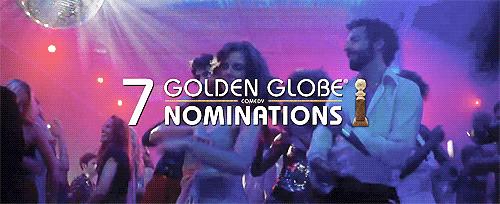It's also a tired genre. When it comes to con games, we've pretty much seen it all. It's easy for audiences to enjoy these films, but it's also hard for them to surprise us, much less delight us. We've seen so many double- and triple-crosses, so many faked death scenes to brush off the marks, so many "Whose side is she on?" femmes fatale that eventually, it all starts to fade to beige.
So when word came down that David O. Russell's next movie was a con man film based on the ABSCAM scandal of the 1970s, I wasn't too excited. Despite a star-studded cast, it looked like the kind of story that writes itself, in a bad way. A period piece, set in one of America's most absurd historical periods, of a scandal that was considered somewhat tawdry and ridiculous, even at the time? The whole thing screamed "extremely broad farce." The commercials for the film seemed to bear that out:
Turns out I was wrong. Here's the rundown--Irving (Christian Bale) is a small time hustler out of the Bronx who owns a string of dry cleaners and runs scams on the side. Amy Adams plays Edith, his partner in crime and soulmate, who pulls in the suckers with plunging necklines and a "sophisticated" accent. Edith and Irving are perfect for each other, but the obstacle in the way of their happiness is Irving's volatile but resolute wife, Rosalyn (Jennifer Lawrence).
FBI agent Richie Dimaso (Bradley Cooper) disrupts this triangle when he stumbles upon Edith and Irving's con. Ambitious and overeager, Richie plans to use the grifters to set up a series busts that will help him make a name for himself at the agency. This being a movie, Richie's plans soon snowball from simple busts against a few other relatively small-time scam artists to a giant sting ensnaring powerful politicians (including an unexpectedly delightful Jeremy Renner).
What saves American Hustle from being that broad farce is a relentless focus on character. You'll notice from the trailer that the movie really leverages the "Yep, this is the Carter administration" vibe. The hairdos and outlandish outfits are in full effect. Russell even goes so far as to raid Tony Manero's closet to dress Cooper up for a Studio 54 scene with Adams. The amazing thing is that all those fashion choices wind up giving us insight into the characters that wear them.
Later, there is a bit involving a "science oven"--a microwave, an exotic technology in the late 70s. The gag goes through the regular paces ("Don't put metal in the science oven!") but what could have been a period throwaway joke instead becomes the basis for a couple of important character moments. In one scene, we see the effect a thoughtful gift can have on someone who probably hasn't received many of them in his life. Then there's the other scene:
Where we see how quickly and easily Rosalyn goes from the panic of blowing up the microwave to "Thank God for me." That really tells you all you need to know about her, and that little reaction shot at the end speaks volumes about her relationship with Irving.
Most of the buzz around American Hustle is going to the female performances, which are excellent. Figuring out what's going on behind Adams's eyes is a movie all in itself; her Edith seems to be constantly flickering between supreme confidence and the panic of a caged animal. Lawrence matches that performance with Rosalyn's intense lunacy. Her approach is the opposite of Adams's. Rosalyn's a picture of certainty, and you constantly see the wheels turning in her brain, transparently churning out one really messed up idea after another. They're two of the best female performances I've seen all year, the only question being, which is a lead and which is supporting?
As good as those performances are, the real revelation in American Hustle is Christian Bale. On the surface, it's one of those performances I'm prone to hate. Bale gained a ton of weight and uglied up for the role--the opening scene is dedicated to showing us his prodigious gut and to show Bale assembling the character's elaborate combover--the kind of thing that screams for Oscar attention. However, the performance that comes with this physical transformation isn't showy, particularly not compared to the ladies; or to Cooper, who's channeling a young John Turturro with his live wire performance as Richie; or even to his own Oscar-winning work in Russell's The Fighter (a more conventional uglied up role).
Irving is American Hustle's straight man. Paunchy and bald, Bale resembles the fat-suited producer character Tom Cruise portrayed in Tropic Thunder. I was expecting a similar torrent of outsized personality and bluster from Bale's character, but it never arrived. Being a cinematic con man is usually a movie star turn. It's about being as cool as Clooney in the Ocean's films, or Hackman in Heist. It's about the shit-eating "I love it when a plan comes together" grins Redford flashes in The Sting, Sneakers, and Spy Game. About big acting moments, like Pam Grier working herself into a panic to fool the Feds in Jackie Brown.
Irving isn't cool or smug. He isn't the consummate actor, or the jaded guy who's got all the angles covered, or the fearless adrenaline junkie who runs scams for the rush of it. He's built on a human scale, holding on by his fingernails as things spiral out of control. This deglamorized take on the con man as someone who is reactive and vulnerable is a subversive element that breathes new life into a tired genre.
Very highly recommended.


Though it's not the best flick of the year, it's definitely one of the most fun and you won't ever find yourself bored. That's for sure. Good review DJ.
ReplyDelete